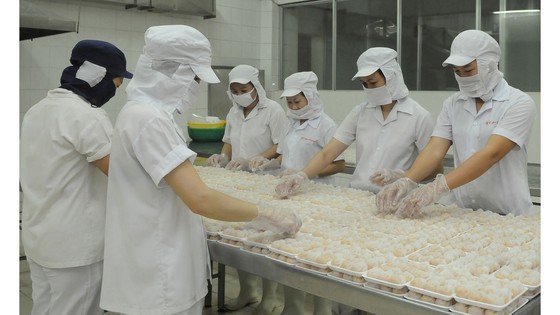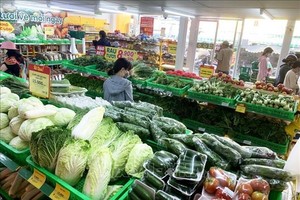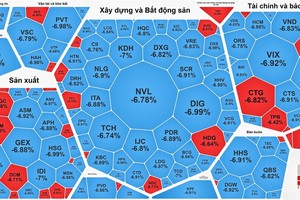
Accordingly, most food processing enterprises have been increasing their production capacity to fulfill their orders. The growth rate of the industry is forecast to be above 10 percent this year. Besides, the wave of investment of foreign enterprises has also been gradually increasing.
The representative of Acecook Joint Stock Company said that the company has raised its production capacity to around 3 billion packs of instant noodles this year, at the same time, planned to continue to increase to around 4.5 million packs if the demand keeps escalating in the future.
As for export, Mr. Mai Hoai Anh, Executive Director – International Sales of the Vietnam Dairy Products Joint Stock Company, said that after participating in the Gulfood Dubai 2020 trade fair, his company has just signed an export contract of milk and dairy products worth US$20 million. This is an opportunity for Vinamilk in particular and the food processing industry of Vietnam in general to promote export to the Middle East, Europe, and Asia.
From other perspectives, many foreign enterprises have been increasing investment into Vietnam amid the context that the Covid-19 outbreak remains happening complicatedly. Japanese enterprises, including Miki House, Uniqlo, and Akuruhi, have been zealously expanding their business network in Vietnam by opening more outlets.
Explaining this matter, many enterprises said that the complicated developments of the Covid-19 outbreak have made the demand for food highly soar as consumers tend to stockpile goods. At many supermarkets, there is still a local shortage of goods. Therefore, production orders have also increased strongly.
Ms. Ly Kim Chi, Chairwoman of the Food and Foodstuff Association of Ho Chi Minh City, said that most food processing enterprises have increased their production capacity to fully meet new orders. Vietnamese enterprises have the advantage of a plentiful and diverse source of raw materials that meets the production demand of large-scale food processing enterprises. Up to 90 percent of raw materials are domestically grown. The country only has to import flour and food additives but the imports of them have also gradually decreased as many domestic enterprises were invested and started to produce these products by themselves to provide for the domestic market.
A factor that is considered to have strongly supported the development of food processing enterprises is the increase of modern domestic and foreign distribution channels that help products of enterprises to approach consumers more easily and diversify distribution channels. These distribution channels include Saigon Co.op, Thailand’s Mega Market, Big C, and B’s Mart, South Korea’s E’Mart, and Japan’s Aeon. China’s Alibaba Group also spent $1 billion to buy the e-commerce platform Lazada to quickly enter the Southeast Asian market. These retail distribution networks, on one hand, help products to be widely distributed in the domestic market, on the other hand, support the indirect export to foreign markets through the global supply chain.
As several food processing enterprises have had to increase production capacity to meet domestic and foreign orders as currently, the growth rate of the industry is expected to exceed 10 percent this year.
The representative of the Ministry of Industry and Trade said that by changing the structure of Vietnamese export products in the direction of increasing the value-added and quality combined with building brands instead of raw export, Vietnamese products have gradually gained a firm position in the global market. Besides, Vietnam also has actively participated in the process of international integration via signed free trade agreements. This is a favorable condition for food processing enterprises to expand the market and increase the export volume to more new markets.
As for the increase of investment of Japanese enterprises in Vietnam, the Japan External Trade Organization Ho Chi Minh City said that the Covid-19 outbreak in China has greatly affected the production and trade activities of Japanese enterprises in this country. The fact that factories of Japan or China were halted operations will make Japanese enterprises lack raw materials, starting from the end of March.
The survey on more than 200 Japanese enterprises also indicated that the impacts on Japanese enterprises in Vietnam were less than those on Japanese enterprises operating in Thailand and China. The investment environment of Vietnam has been improved significantly and stably in the previous years. Therefore, shifting their investments to Vietnam might be a necessary alternative solution to reduce risks for Japanese enterprises.
The representative of Acecook Joint Stock Company said that the company has raised its production capacity to around 3 billion packs of instant noodles this year, at the same time, planned to continue to increase to around 4.5 million packs if the demand keeps escalating in the future.
As for export, Mr. Mai Hoai Anh, Executive Director – International Sales of the Vietnam Dairy Products Joint Stock Company, said that after participating in the Gulfood Dubai 2020 trade fair, his company has just signed an export contract of milk and dairy products worth US$20 million. This is an opportunity for Vinamilk in particular and the food processing industry of Vietnam in general to promote export to the Middle East, Europe, and Asia.
From other perspectives, many foreign enterprises have been increasing investment into Vietnam amid the context that the Covid-19 outbreak remains happening complicatedly. Japanese enterprises, including Miki House, Uniqlo, and Akuruhi, have been zealously expanding their business network in Vietnam by opening more outlets.
Explaining this matter, many enterprises said that the complicated developments of the Covid-19 outbreak have made the demand for food highly soar as consumers tend to stockpile goods. At many supermarkets, there is still a local shortage of goods. Therefore, production orders have also increased strongly.
Ms. Ly Kim Chi, Chairwoman of the Food and Foodstuff Association of Ho Chi Minh City, said that most food processing enterprises have increased their production capacity to fully meet new orders. Vietnamese enterprises have the advantage of a plentiful and diverse source of raw materials that meets the production demand of large-scale food processing enterprises. Up to 90 percent of raw materials are domestically grown. The country only has to import flour and food additives but the imports of them have also gradually decreased as many domestic enterprises were invested and started to produce these products by themselves to provide for the domestic market.
A factor that is considered to have strongly supported the development of food processing enterprises is the increase of modern domestic and foreign distribution channels that help products of enterprises to approach consumers more easily and diversify distribution channels. These distribution channels include Saigon Co.op, Thailand’s Mega Market, Big C, and B’s Mart, South Korea’s E’Mart, and Japan’s Aeon. China’s Alibaba Group also spent $1 billion to buy the e-commerce platform Lazada to quickly enter the Southeast Asian market. These retail distribution networks, on one hand, help products to be widely distributed in the domestic market, on the other hand, support the indirect export to foreign markets through the global supply chain.
As several food processing enterprises have had to increase production capacity to meet domestic and foreign orders as currently, the growth rate of the industry is expected to exceed 10 percent this year.
The representative of the Ministry of Industry and Trade said that by changing the structure of Vietnamese export products in the direction of increasing the value-added and quality combined with building brands instead of raw export, Vietnamese products have gradually gained a firm position in the global market. Besides, Vietnam also has actively participated in the process of international integration via signed free trade agreements. This is a favorable condition for food processing enterprises to expand the market and increase the export volume to more new markets.
As for the increase of investment of Japanese enterprises in Vietnam, the Japan External Trade Organization Ho Chi Minh City said that the Covid-19 outbreak in China has greatly affected the production and trade activities of Japanese enterprises in this country. The fact that factories of Japan or China were halted operations will make Japanese enterprises lack raw materials, starting from the end of March.
The survey on more than 200 Japanese enterprises also indicated that the impacts on Japanese enterprises in Vietnam were less than those on Japanese enterprises operating in Thailand and China. The investment environment of Vietnam has been improved significantly and stably in the previous years. Therefore, shifting their investments to Vietnam might be a necessary alternative solution to reduce risks for Japanese enterprises.
























